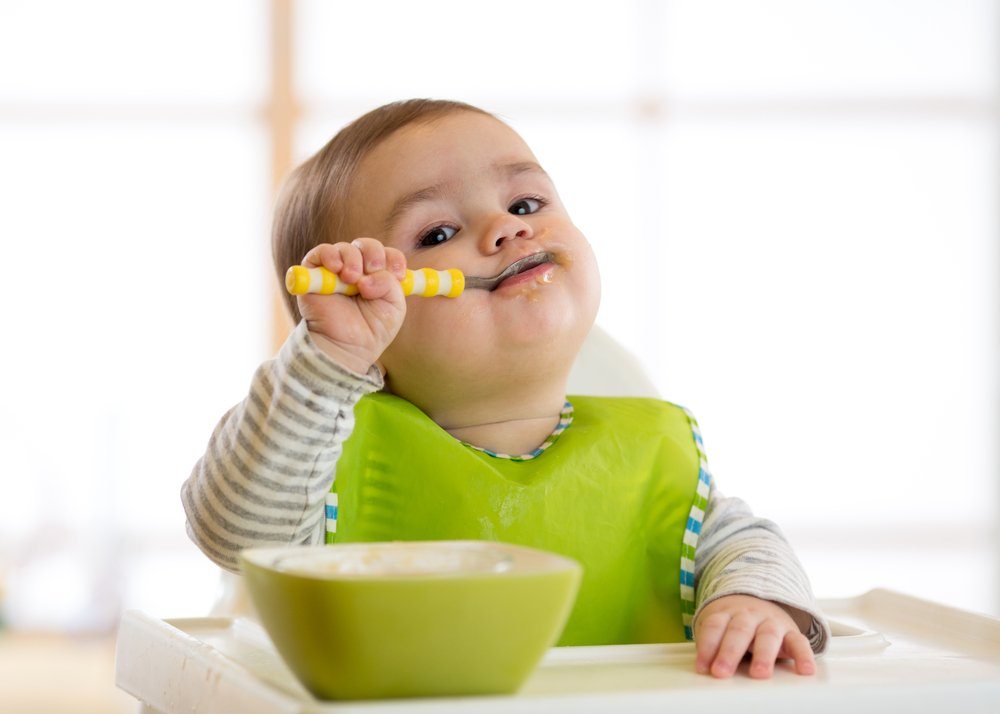Key points:
1. Between 8-12 months, expect your child to explore food and eating, which can be messy and playful.
2. Encourage their independence and motor skills development during mealtime.
3. Around 13-17 months, they’ll become more adept with utensils, but accept that they may still use their hands.
4. By 18-24 months, your child should use utensils and cups independently; keep mealtimes interactive and supervise their eating.
At around 18 months your child will be able to use utensils and drinking cups during meal times. However, before they reach this stage, at 7-8 months they’ll start using their fingers to grab food; this is where the fun begins. Let’s take a look at how these next months will look like!
8-12 months
Your little one will be excited to eat just about anything you put in front of them. Get ready, because these months will be as messy and smelly as they can get. Don’t worry if, at the beginning, they start “playing with the food”; this is them experimenting with their independence and control. Remember that during this time they’re all about imitating your expressions and simple actions, so, instead of getting alarmed, teach them how to do it with your example. It might be inconvenient to let them explore their food every time they eat but try to reserve some time for doing just that every chance you have. This way they’ll start learning to eat by themselves.
At around 10 months your child will learn to grasp objects with just their thumb and index finger. So, even if there are spills, drops, or mess, try to keep in mind that they’re cementing muscle strength and coordination into their memory. They are also learning how to use gestures to ask for help while also exploring by themselves. Try to give them space to experiment and learn, but reassure them that you are there to help if they struggle.
At around 12 months they’ll begin to understand how to use several objects for their intended use, including a cup for drinking water. This is part of their growing independence, so keep introducing them to the use of different child-safe utensils. Even if they still don’t know how to use them on their own, they’ll keep learning. Try to offer them 2-3 snacks a day so they don’t arrive starving to the next meal. It’s also helpful to teach them a structured-sit down snack time as opposed to letting them continue playing while eating. Offer foods that can be picked up and chewed, that are soft to swallow, and avoid foods that are common choking hazards such as nuts or grapes.
13-17 months
During this time, they’ll know how to use an object after they see you using it. To stimulate their independence and sense of autonomy keep teaching them how to use different utensils. Of course, they’ll be more excited to use their hands, and this is okay too; as long as they do it in a well-behaved manner. The important part is that they keep learning how to feed themselves independently and eventually use utensils the proper way. Be flexible with food acceptance as toddlers are often reluctant to try new things. If your little one refuses a food, don’t make a big deal out of it, simply try again in a few days or weeks. Make sure to use unbreakables as they may throw food or plates around when they are bored or dislike something. If this happens make sure to let them know this is an unwanted behavior.
At around 15 months they’ll control the movement to bring food into their mouth. They’ll be able to fill their spoon and get it to their mouth consistently. If you are using forks, make sure they have dull prongs. Be patient, although they have more control over the utensils, they will occasionally tip the wrong way and spill the food at the last second. Make it easy for them and cut everything to a bite size. Let them know they’re doing okay and help them continue to grow their hand coordination abilities, self-care, and independence.
18-24 months
Around this time, the spills will finally come to an end. Your child will be able to use a spoon, a fork, and a cup during meal times. However, there will still be times when they’d rather finger paint with their soup or turn their plate into a magic carpet; watch out! Don’t use dessert as a reward and try foods that are easy for them to manage such as scrambled eggs or soft cooked vegetables. Keep them seated during meal times to foster self-regulation and always supervise when they’re eating. Keep it interactive and fun by pointing and naming the different types of food and colors.
Remember they’re learning new words, so use the time to talk and connect with your family. As they learn new words and gestures, they’ll be able to express when they’re hungry or full, as well as their preferences. Keep in mind that every child develops at their own pace and has a unique personality. While some children are messy eaters, others might get upset when their food spills or they get a little smudge on their hands. Keep practicing and their independence, hand coordination, language, and dexterity skills will thrive. You’ll also see how this reflects on their self-care abilities when getting dressed.








